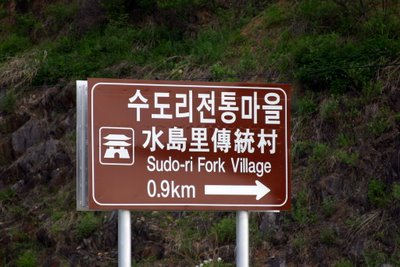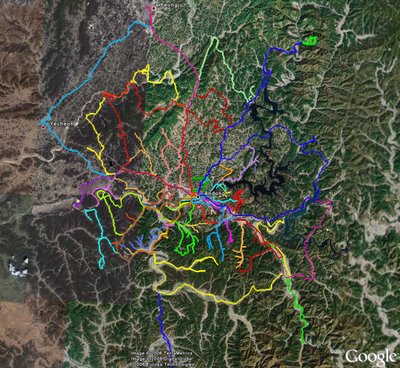Engrish
No that is not a typo in the headline. One thing ESL/EFL teachers have to deal with is that countries that do not natively speak English often develop their own particular form of what they think English is. A common slang for this non-native version of English is "Engrish". You can read all about it on Wikipedia, but basically "Engrish" is the mistranslation of the native language into what is thought to be correct English, or, incorrect words based on the mispronunciation of English. Koreans have their own particular problem with English often referred to as "Konglish", the misuse of English words in the Korean language- "apart" for apartment, "handle" when they mean steering wheel, and many others. But for now, let's focus on Engrish.
The other day I was out riding and saw this ...

I enjoy learning about about foreign cultures just as much as the next person. But I have to say, I was a bit disappointed when I got to the village and didn't see one fork. In fact, there was no tableware to be seen at all. No forks, knives, spoons, gravy boats, not even a single chopsticks.
If you haven't figured it out yet, that should read "folk" village. Yes, the constant R/L problem for Asians rears its ugly head again. OK, so they made a mistake. But you would think that something like that would be easily spotted, even by a non-English speaker.
Here in Korea, other than on informational signs, English seems to be used to give a product an important air, as if having English text on a product makes it better, more important than any other product. That actually is a bit odd from a non-Korean's perspective since probably 95% of the products that use some form of English are actually being advertised for Koreans who would not necessarily understand or care about the English writing anyway.
There are thousands, if not tens of thousands, of examples, but let me give you one rather prominent example. A while back when new credit cards were coming out left and right, one big name company brought out a credit card and called it the "She's card." Now I don't know this for a fact, and I can think of no other logical explanation, so I have to assume that what they were actually thinking of was "Her card." Why would they call their credit card the "She is card?"

The Korean language has a character that functions very similar to the apostrophe s ('s) in English, and in Korean, they can stick it on everything. Unfortunately, whoever dreamed up this product apparently wasn't aware that the 's does not go with personal pronouns.
What is even more amazing to me is that, apparently, from this product's inception through production, not once did anyone bother to actually check to see if the language was correct. This is a big name company, surely they could have stopped a foreign employee in the hallway, spent five minutes explaining the concept to them and found out that the name was incorrect. Heck, even an above average Korean speaker of English could have seen the mistake. Yet the product went through the design, approval, and production process without one person bothering to question the correctness, let alone the actual necessity of the English.
This happens all the time here. Surely if you are going to spend thousands of dollars on a product and advertising campaign, you can spend ten more minutes, call up a native speaking English teacher at a university or even a "hagwon" (private 'cram' school), ask them about the English and, heck, give them $25 for their time. It would save your company a lot of embarrassment later on. Needless to say, promotion of the "She's" credit card didn't last too long, though it still exists.
"Always blame it on the guy who doesn't speak English."
~ Homer Simpson
"If you talk to a man in a language he understands, that goes to his head. If you talk to him in his language, that goes to his heart."
~ Nelson Mandela
"I speak two languages, Body and English."
~ Mae West


 In a large rest area parking lot next to the expressway, I rode my bicycle around to draw my initials. It is kind of like virtual graffiti on a large scale. At the time, I thought I was making the letters rather big, but apparently not as big as I had thought.
In a large rest area parking lot next to the expressway, I rode my bicycle around to draw my initials. It is kind of like virtual graffiti on a large scale. At the time, I thought I was making the letters rather big, but apparently not as big as I had thought. 









